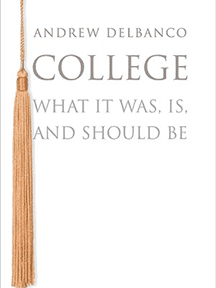By Anahita Sotoohi
Andrew Delbanco, the director of American studies at Columbia University, visited Washington College on April 6 to discuss his latest book, College: What It Was, Is, and Should Be (Princeton University Press, 2012). The event was co-sponsored by the college’s Phi Beta Kappa chapter and English department.
The book won the 2013 Philip E. Frandson Award for Literature in the Field of Continuing Education and met with favorable reviews from the New York Times as well as Kirkus Reviews. Delbanco himself has received Columbia University’s Great Teacher Award and a 2011 National Humanities Medal “for his writings on higher education and the place classic authors hold in history and contemporary life.”
College is a meditation on the role of higher education—specifically, what role college should play in our culture. Facing today’s tough economy, students are pressured to choose more “practical” degrees that will equip them with the knowledge necessary to enter a particular profession when they graduate. The idea that college should provide an opportunity to think, learn, explore, and grow intellectually for four years has become, to some, laughable.
In his book, Delbanco launches a defense for the latter college experience and cautions the reader that going through college in that fashion should not be solely the province of the very wealthy—but instead available to as many students as possible. The end result of limiting access to a liberal education, Delbanco said in an interview with PBS, is “a stratification of the higher education system.” Ultimately, Delbanco said, he doesn’t have a “sweeping answer” but rather thinks that “every institution has to tackle [this problem] on its own terms.”
The book has not been without controversy. There is, of course, the most obvious counterargument, that college should be directly and obviously practical and the model of college Delbanco supports is useless. In an interview with Inside Higher Ed, Delbanco conceded that the majority of his book focused on small, residential private colleges, an approach that could be construed as itself restricted.
However, Delbanco argued in that same interview, such colleges are “the oldest educational institutions in America” and most professors are trained at the same small group of research universities. Therefore, Delbanco says, “what happens, or doesn’t happen, in a few well-known institutions matters to virtually every college in America.” In a later interview with PBS, Delbanco said that “the community colleges are every bit as important as the Harvards and the Yales.”
The topic of college’s usefulness is one that Delbanco has mined for some time. In 2008 he gave a series of lectures at Princeton University titled “Does College Really Matter? The History of Undergraduate Education, Why It’s in Trouble, and What to Do About It.” Those talks would prove productive for the development of College, a controversial but worthwhile book for Phi Beta Kappa members who are concerned about the fate of higher education in the liberal arts.
Anahita Sotoohi is a senior at Agnes Scott College double majoring in classical languages and art history. Agnes Scott is home to the Beta of Georgia chapter of Phi Beta Kappa.
Andrew Delbanco became a member of Phi Beta Kappa at Harvard University in 1972.




